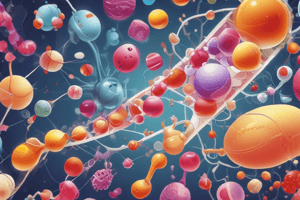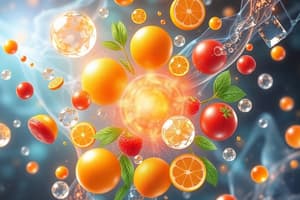Podcast
Questions and Answers
Which symptom is NOT associated with Vitamin B1 deficiency?
Which symptom is NOT associated with Vitamin B1 deficiency?
- Severe nervous disorders
- Muscle wasting
- Loss of appetite
- Cracked and red lips (correct)
What is a significant consequence of severe Vitamin B1 deficiency?
What is a significant consequence of severe Vitamin B1 deficiency?
- Dermatitis
- Beri-beri disease (correct)
- Iron-deficiency anemia
- Delayed wound healing
Among the following, which vitamin is particularly unstable and destroyed by heat?
Among the following, which vitamin is particularly unstable and destroyed by heat?
- Vitamin B3
- Vitamin B2
- Vitamin B1 (correct)
- Vitamin B4
What is a common dietary source of Vitamin B2?
What is a common dietary source of Vitamin B2?
Which of the following is NOT a function of Vitamin B2?
Which of the following is NOT a function of Vitamin B2?
Which vitamin is primarily associated with fatty acid synthesis?
Which vitamin is primarily associated with fatty acid synthesis?
What is the daily requirement of folic acid for pregnant women?
What is the daily requirement of folic acid for pregnant women?
Which of the following is not a source of vitamin B12?
Which of the following is not a source of vitamin B12?
The deficiency of which vitamin is most likely to result in spina bifida during pregnancy?
The deficiency of which vitamin is most likely to result in spina bifida during pregnancy?
What effect does a deficiency in vitamin B12 primarily have on the body?
What effect does a deficiency in vitamin B12 primarily have on the body?
What is the primary function of water-soluble vitamins?
What is the primary function of water-soluble vitamins?
Which of the following vitamins is known to enhance iron absorption?
Which of the following vitamins is known to enhance iron absorption?
What is the daily requirement of Vitamin C for adults?
What is the daily requirement of Vitamin C for adults?
Which of the following is NOT a symptom of Vitamin C deficiency?
Which of the following is NOT a symptom of Vitamin C deficiency?
Which source is highest in Vitamin C?
Which source is highest in Vitamin C?
What is a consequence of prolonged Vitamin C deficiency?
What is a consequence of prolonged Vitamin C deficiency?
How are excess amounts of Vitamin C handled by the body?
How are excess amounts of Vitamin C handled by the body?
Which vitamin is essential for collagen synthesis?
Which vitamin is essential for collagen synthesis?
What is the maximum daily intake of niacin for adults of all ages?
What is the maximum daily intake of niacin for adults of all ages?
Which of the following symptoms is NOT associated with mild niacin deficiency?
Which of the following symptoms is NOT associated with mild niacin deficiency?
Which food source is a significant contributor of Vitamin B3?
Which food source is a significant contributor of Vitamin B3?
What is the primary function of Pantothenic acid?
What is the primary function of Pantothenic acid?
What is a common result of Vitamin B6 deficiency?
What is a common result of Vitamin B6 deficiency?
Which of these vitamins is known for its stability to heat but sensitivity to light?
Which of these vitamins is known for its stability to heat but sensitivity to light?
Which group requires the highest daily intake of niacin?
Which group requires the highest daily intake of niacin?
What is a rare consequence of Pantothenic acid deficiency?
What is a rare consequence of Pantothenic acid deficiency?
Flashcards
Water-soluble vitamins
Water-soluble vitamins
Vitamins that dissolve in water and are not stored in the body.
Vitamin C function
Vitamin C function
Crucial for collagen production, antioxidant, aids in iron absorption, and many metabolic processes.
Vitamin C deficiency
Vitamin C deficiency
A lack of vitamin C in the body. Symptoms include fatigue, skin issues and bleeding gums.
Vitamin C daily requirements
Vitamin C daily requirements
Signup and view all the flashcards
Vitamin C toxicity
Vitamin C toxicity
Signup and view all the flashcards
Vitamin C sources
Vitamin C sources
Signup and view all the flashcards
B Vitamins function
B Vitamins function
Signup and view all the flashcards
What are B Vitamins?
What are B Vitamins?
Signup and view all the flashcards
Niacin (Vitamin B3) Function
Niacin (Vitamin B3) Function
Signup and view all the flashcards
Biotin's Role
Biotin's Role
Signup and view all the flashcards
Biotin Deficiency Symptoms
Biotin Deficiency Symptoms
Signup and view all the flashcards
Folic Acid's Importance
Folic Acid's Importance
Signup and view all the flashcards
Folic Acid During Pregnancy
Folic Acid During Pregnancy
Signup and view all the flashcards
Vitamin B12's Key Function
Vitamin B12's Key Function
Signup and view all the flashcards
Niacin Stability
Niacin Stability
Signup and view all the flashcards
Daily Niacin Needs
Daily Niacin Needs
Signup and view all the flashcards
Niacin Deficiency
Niacin Deficiency
Signup and view all the flashcards
Panthotenic Acid Function
Panthotenic Acid Function
Signup and view all the flashcards
Panthotenic Acid Deficiency
Panthotenic Acid Deficiency
Signup and view all the flashcards
Study Notes
Water Soluble Vitamins
- Water-soluble vitamins include 8 B vitamins and vitamin C
- These vitamins function primarily as enzyme cofactors
- They are hydrophilic, dissolving readily in water
- Not stored in the body, so consistent daily intake is essential
- They are excreted from the body
Vitamin C (Ascorbic Acid)
- A water-soluble vitamin
- Essential for collagen synthesis
- Acts as a cofactor for several enzymes
- Easily oxidized and a potent antioxidant
- Aids in iron absorption
- Crucial for bile acid formation
- Important in red blood cell maturation
- Helps synthesize norepinephrine from dopamine
- Plays a role in various metabolic processes, including cellular respiration and carbohydrate metabolism, and in the synthesis of lipids and proteins
- Maintains a healthy immune system
- Enhances the synthesis of collagen (important component of ligaments, tendons, cartilages, and skin)
- Daily requirements: 30-50 mg/day
- Vitamin C is not toxic; excess is excreted in urine
- Sources: citrus fruits, tomatoes, leafy vegetables, and potatoes
Vitamin B1 (Thiamine)
- Essential for carbohydrate metabolism
- Highly soluble in water and unstable
- Vital for gastrointestinal, cardiovascular, and nervous systems
- Daily requirements: 1.1–1.5 mg/day
- Sources: grains, meat, yeast, and nuts
- Deficiency leads to beriberi (loss of appetite, muscular weakness, and nerve problems)
Vitamin B2 (Riboflavin)
-
Necessary for embryo development and amino acid and carbohydrate metabolism
-
Crucial in protein building and tissue health and growth.
-
Daily requirement: 1.5-1.8 mg/day
-
Not toxic
-
Light sensitive but heat resistant
-
Sources: foods of animal origin (liver, beef, milk, fish, eggs), cocoa, nuts, yeast
-
Deficiency symptoms include: cracked and red lips, inflammation of mouth lining and tongue, dry/scaling skin, and dermatitis.
Vitamin B3 (Niacin)
- Important for general good health, and crucial for cell metabolism and energy production
- Higher amounts can improve cholesterol levels and reduce cardiovascular risk
- Stable to heat and acid
- Daily requirements vary by age and gender (see table)
- Sources: foods of animal origin, yeast, sunflower seeds, beans, peas, green leafy vegetables and carrots
- Deficiency symptoms (pellagra) include diarrhea, dermatitis, dementia
Vitamin B5 (Pantothenic Acid)
- Essential in various reactions, including the formation of sterols (cholesterol and 7-dehydrocholesterol), fatty acids, and keto acids (e.g., pyruvic acid).
- Essential for wound healing and cholesterol metabolism
- Rare to be toxic in high doses but can cause paresthesia
- Daily requirements vary by age and gender (see table)
- Sources: meat, foods of animal origin, yeast, wholemeal bread, broccoli, avocados, royal jelly
Vitamin B6 (Pyridoxine)
- Crucial for nervous and immune system function, red blood cell metabolism and hemoglobin formation, and blood glucose regulation
- Stable to heat, but sensitive to light
- Daily requirements: 1.5-2 mg/day
- Sources: cereals, beans, meat, liver, fish, yeast, some fruits, and potatoes
- Deficiency symptoms include: skin inflammation (dermatitis), neurological issues (depression, confusion, convulsions)
Vitamin B7 (Biotin)
- Acts as a coenzyme in fatty acid synthesis
- Deficiency is rare but can cause dermatitis, anorexia, nausea, and muscle pain
- Daily requirements vary by age and gender (see table)
- Sources: sources of animal origin, yeast, wholemeal bread, broccoli, avocados, and royal jelly
Vitamin B9 (Folic Acid)
- Important for nucleotide synthesis, important in rapidly dividing cells (vital during pregnancy).
- Essential for amino acid metabolism
- Stable vitamin
- Daily requirements vary by age and gender (see table)
- Sources: Animal sources, Milk and related products, yeast and leafy green vegetables
- Deficiency can cause anemia and neural tube defects in pregnancy
Vitamin B12 (Cobalamin)
- Crucial for red blood cell maturation; protects against pernicious anemia; and helps with cell growth and reproduction
- Important for myelin and nucleoprotein formation
- Deficiency can lead to anemia
- Daily requirement varies with age (see table)
- Sources: fish, shellfish, meat, liver, poultry, eggs, milk and milk products
Studying That Suits You
Use AI to generate personalized quizzes and flashcards to suit your learning preferences.




